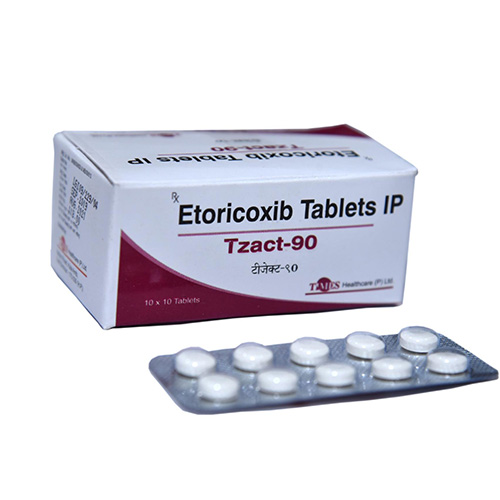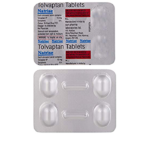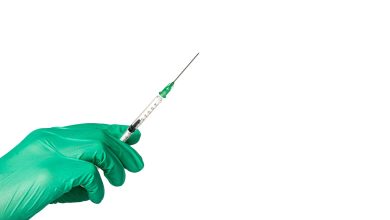Tzact 90mg Tablet: Uses, Dosage, Side Effects, Interactions

Tzact 90mg Tablet is a brand of Etoricoxib (90mg) produced by Arvincare Pharma. Etoricoxib is a selective inhibitor of cyclooxygenase-2 (COX-2), an enzyme involved in pain and inflammation. It is a member of the COX-2-selective (coxib) class of nonsteroidal anti-inflammatory drugs (NSAIDs).
Tzact 90mg Tablet is used to minimize inflammation (swelling) and alleviate pain in arthritic disorders including osteoarthritis, rheumatoid arthritis, and ankylosing spondylitis. It’s also used for short-term pain relief during gout attacks and after dental surgery.
How does Tzact work?
Tzact belongs to a group of medicines called cyclooxygenase-2 (COX-2) specific inhibitors (also known as coxibs).
The body produces two similar enzymes called COX-1 and COX-2. COX-1, among other functions, is involved with protecting the stomach, while COX-2 plays a role in joint inflammation and pain.
Tzact reduces pain and inflammation by blocking COX-2, an enzyme in the body.
Tzact does not block COX-1, the enzyme involved in protecting the stomach from ulcers.
Other anti-inflammatory medicines (NSAIDS) block both COX-1 and COX-2.
Tzact relieves pain and inflammation with less risk of stomach ulcers compared to NSAIDs.
However, taking aspirin with Tzact may reverse this benefit (see Before you take Tzact, Taking Other Medicines).
In clinical studies, the risk of developing ulcers on Tzact was lower than with NSAIDs. Some people developed ulcers whether they were taking Tzact or placebo in these studies; however, the rate was higher on Tzact.
If any of the following symptoms: shortness of breath, chest pains, or ankle swelling appear or worsen, stop your treatment with Tzact and consult a doctor, as soon as is practical.
If you have kidney, liver, or heart disease, your doctor will want to appropriately keep a check on you.
If you develop any symptoms that could indicate a severe allergic reaction such as an inability to breathe or a serious skin reaction you must consult a doctor on an urgent basis.
Your doctor will want to discuss your treatment from time to time. It is important that you use the lowest dose that controls your pain and you should not take Tzact for longer than necessary. This is because the risk of heart attacks and strokes might increase after prolonged treatment, especially with high doses.
Tzact can increase blood pressure in some people, especially in high doses, and this could increase the risk of heart attacks and strokes. Your doctor will want to check your blood pressure from time to time, to make sure that it is safe to continue treatment.
Before taking this medication:
Before taking Tzact 90mg talk with your doctor if you are allergic to it or any other medications. The product will contain some inactive ingredients which can cause some serious allergic reactions or some other serious problems. Before using the medication, talk to your doctor if you have any medical history such as asthma, allergic disorder, stomach pain, inflammatory bowel disorder, or any other heart condition.

How to use Tzact 90mg?
Tzact 90mg tablets should be taken only once a day. You may take your tablet with or without food, but taking it without food can cause it to function more quickly. If you have arthritis, you’ll most likely need to take a pill every day for reducing inflammation and pain. Take one tablet a day for up to eight days if you have acute gout.
Tablets are available in four strengths: 30mg, 60mg, 90mg, and 120mg. The intensity of the medication you’re given is determined by the reason you’re taking it.
- The normal dosage for osteoarthritis is 30 mg once a day, which can be raised to 60 mg if necessary.
- The normal dosage for rheumatoid arthritis and ankylosing spondylitis is 60 mg once a day, which can be raised to 90 mg if required.
- The normal dosage for acute gout is 120 mg once a day for up to eight days.
- The normal dosage for pain after dental surgery is 90 mg once a day, for a period of three days.
What happens if I miss a dose?
If you forget to take your tablet, take it as soon as you remember. If you forget to take the dosage until the next day, just skip the missed dose and carry on with your daily schedule. To make up for a missed dose, avoid taking double doses.
What happens if overdose?
If you suspect an overdose, call your doctor right away. Skin rashes, confusion, chest pain, and blurred vision are some symptoms of overdose.
What are the side effects of Tzact?
Some of the common and major side effects of Tzact are:
- Flu
- Indigestion
- Stomach pain
- Diarrhea
- Peripheral edema
- Flatulence
- Weakness
- Fatigue
- Nausea
- High blood pressure
- Irregular heartbeat
- Difficult while breathing
- Heart rhythm disorders
Tzact can cause some serious side effects and can lead to some serious health problems. If you are facing any of the above serious side effects. Talk with your doctor if you are having any serious problems.
Is Tzact safe for kidneys?
When offered to some patients, even a short course of treatment with the new COX-2 inhibitor etoricoxib has the potential to cause renal failure and life-threatening hyperkalemia.
Is Tzact better than naproxen?
Tzact is a potent cyclooxygenase-2 (COX-2) inhibitor used to treat rheumatoid arthritis. In a 12-week trial, etoricoxib (90 mg once daily) was found to be more effective in treating rheumatoid arthritis than naproxen (500 mg twice daily) or placebo.
What medications may interact with Tzact?
- Warfarin
- Rifampin
- Methotrexate
- Aspirin
- Oral Contraceptives
- Hormone Replacement Therapy
This list is not complete and many other drugs may affect Tzact. This includes prescription and over-the-counter medicines, vitamins, and herbal products. Not all possible drug interactions are listed here.





